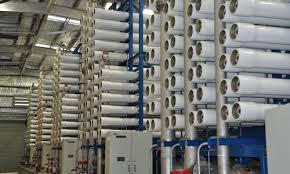How is Reverse Osmosis Used In Tertiary Sewage Treatment Applications?

Salts and other dissolved solids can be pretty tricky to remove from wastewater streams. Standard filtration does not really do anything about dissolved solids and neither does coagulation or sedimentation. These might manage to reduce TDS in some measure, but in situations where total dissolved solids (TDS) are particularly high, additional treatment is required. This is why tertiary sewage treatment using reverse osmosis will allow for the safe & compliant discharge or reuse of this wastewater stream.
Some industries produce more TDS in their wastewater streams than others. Whether they want to safely discharge their wastewater or reuse it, those high TDS levels present a challenge to meet disposal requirements. One solution is the use of reverse osmosis desalination. With a membrane selective to water, even some of the smallest particles are removed from the wastewater effluent. Below, we will discuss a few industries that make use of reverse osmosis desalination in their tertiary wastewater treatment applications for water reuse or compliant discharge.
Industries
Oil / Gas
Oil fields are well known for producing brine water that has been trapped underground with the oil and gas. Standard treatments can handle lower salinity brines, but not elevated TDS water. In many cases, reverse osmosis is used as a tertiary treatment to remove the salts and any other dissolved solids. In this way, water can either be used to get more oil out of the well, reuse in irrigation or other non potable uses, or safely discharged in some manner. The RO process is typically not applicable to water streams containing TDS levels above 47,500mg/l.
Power Plants
Power plants use water in boilers to creat steam as well as in cooling towers. Without clean water, these systems don’t operate at maximum efficiency and are subject to higher operational costs. Often times, power plant feed water contains salts, hardness minerals or other trace contaminants. Tertiary reverse osmosis can take care of those types of contaminants, and leave the boilers and cooling towers running smoothly. The wastewater produced from these can also be sent through the treatment for tertiary sewage treatment & reuse to reduce raw water usage.
Hotel / Resorts
Hotels and resorts have been treating their grey water on-site for non potable reuse applications. If they made use of reverse osmosis in a tertiary sewage treatment stage they would have the potential to also reuse grey water for other process water applications on their properties or for potable water if regulations allow.
Food / Beverage Processing
Water is an important ingredient in many food and beverage products. It is also used for cleaning and rinsing and other such applications during processing. Many of these applications, particularly as an ingredient, require water that is of high quality, if not potable. Using tertiary sewage treatment with reverse osmosis, dissolved solids and trace contaminants can easily be dealt with to make the wastewater reusable.
Textiles
The dyeing process in the textile industry requires a lot of pure water. Contaminants can cause issues with the machines they use. The dissolved salts and dyes in the wastewater can be difficult to remove by other means so tertiary sewage treatment using reverse osmosis is very popular in the textile industry for wastewater treatment.
Pulp / Paper
Making pulp and paper requires a great deal of high-quality water in order to produce a high-quality product. It is beneficial to the manufacturing company to be able to reuse their wastewater to reduce costs and to reuse it in processes that need water of a particular grade.Utilizing an RO system for tertiary sewage treatment can aid in ths reuse effort.
Pharmaceuticals
More recently there has been growing concern about the potential effects of pharmaceuticals in drinking water. This comes as a result of pharmaceutical manufacturers treating their wastewater in standard treatment facilities that are unequipped to treat for such small, complex compounds. Therefore, pharmaceutical companies have felt more pressure to self treat their wastewater and to help do that, they have used reverse osmosis as a tertiary sewage wastewater treatment step. The treated water can be safely discharged afterward.
Semiconductor / Metals manufacturing
The manufacturing of semiconductors and metals can leave a few harmful and difficult to treat pollutants in their wastewater. For instance, semiconductors are known for leaving behind PFOS in its wastewater following production. PFOS has been of great concern in recent years, but reverse osmosis can remove nearly all traces of the chemical in wastewater. In metals manufacturing, pure water is needed for rinsing or else spots can be left behind on the surface of the metal. RO has been used frequently used a tertiary treatment for rinse water to sufficient quality for reuse.
As you can see, reverse osmosis in tertiary sewage treatment has a variety of applications. It can allow municipalities and industries alike to recycle wastewater for potable use as well if regulations allow. In industrial applications, tertiary sewage treatment using RO can be used for streams containing elevated levels of TDS.
Do you want to know more about how reverse osmosis in a tertiary sewage treatment application can be suitable for compliant discharge or sustainable reuse? Contact the tertiary reverse osmosis experts at Genesis Water Technologies, Inc. at 1-877-267-3699 or reach out to us via email at customersupport@genesiswatertech.com to discuss your specific application.

